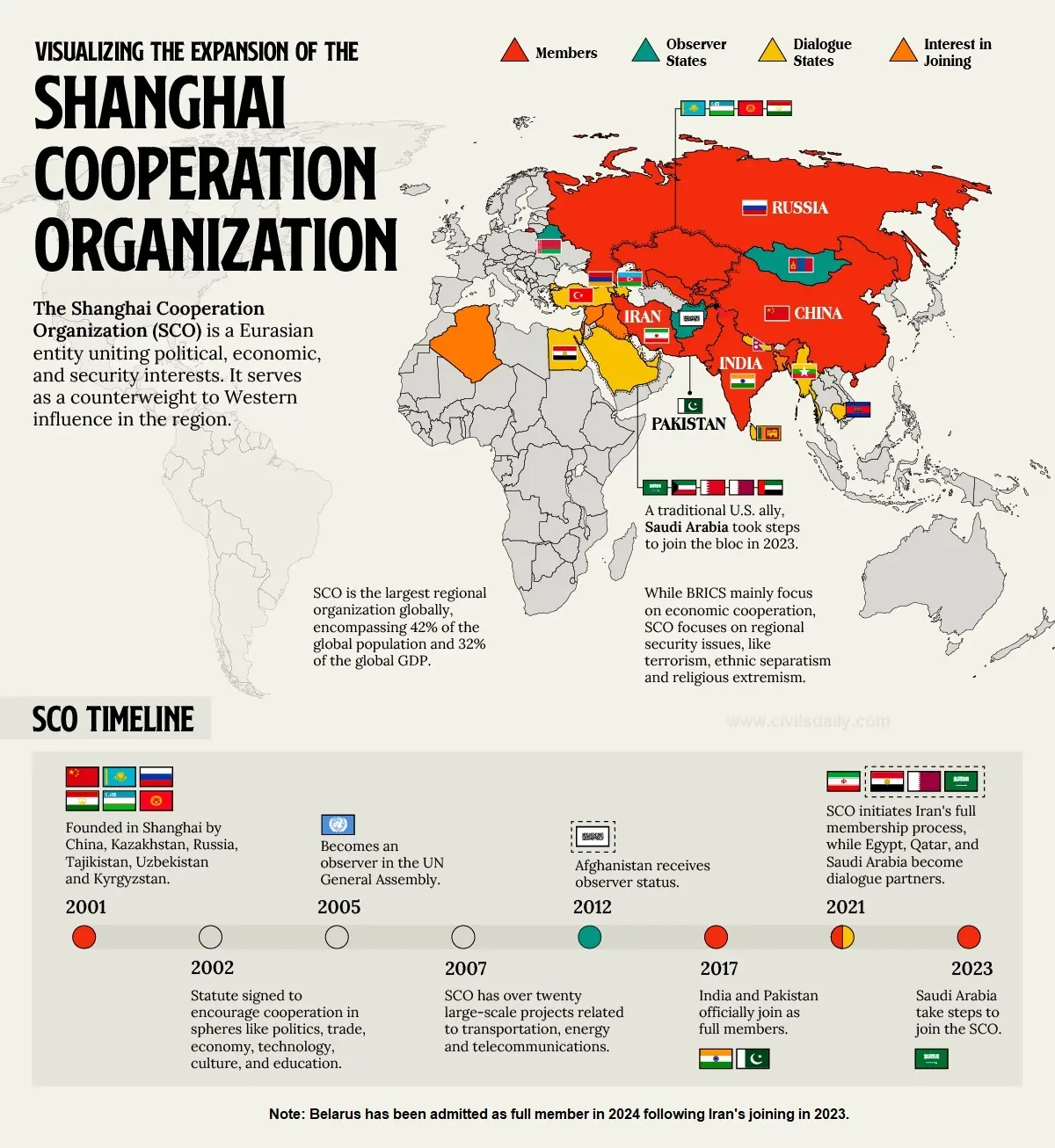1) Why in the News
The Shanghai Cooperation Organisation (SCO) held its leaders’ summit in 2025, setting a fresh direction for cooperation across security, trade, energy, digital economy, and people-to-people ties. India took part with a clear focus: security, connectivity, and opportunity. Members signalled a move to deliver tangible outcomes that citizens and small businesses can feel.
- Summit signalled a more practical phase of cooperation.
- Focus areas: energy transition, digital economy, education, skills.
- Chairmanship passed per the rotating leadership system.
- India underscored counterterrorism, fair trade facilitation, and safe connectivity.
- SCO’s Eurasian span matters for markets, transit routes, and energy.

2) Background
Founded in 2001 with a strong security focus, the SCO expanded into economic and cultural cooperation. Its guiding idea—the Shanghai Spirit—values mutual respect, equality, and practical cooperation. Members today include China, India, Russia, Pakistan, Kazakhstan, Kyrgyzstan, Tajikistan, Uzbekistan, Iran, and Belarus, alongside observers and dialogue partners.
- Shanghai Spirit: Cooperate despite differences; pursue win–win outcomes.
- RATS: SCO’s Regional Anti-Terrorist Structure for counterterrorism, separatism, extremism.
- Council of Heads of State: Annual leaders’ summit setting direction.
- Rotating chair: Leadership changes each year.
- Working groups: Sector teams on trade, energy, health, education, culture, digital, and more.
- Why India cares: SCO covers key routes, energy suppliers, and large markets.
3) What Changed Recently & Why It Matters for India
The 2025 summit emphasised sector platforms—working groups and projects with time-bound results. For India, this sharpens avenues to push counterterrorism outcomes, paperless trade, student and skill exchanges, and clean energy cooperation—with sovereignty and standards intact.
- Tighter cooperation in energy, green industry, digital economy, and education.
- Recent membership growth enlarged SCO’s footprint and market size.
- New chair country to host major meetings through the next year.
- India pressed for action on terrorism, fair trade rules, and transparent, sustainable connectivity.
- Shift from broad statements to time-bound action plans.
4) Benefits & Opportunities (for people, economy, governance)
With clear, small, and doable projects, gains can be visible within a year. India’s near-term wins: easier trade, energy security, health & pharma collaboration, skills development, and privacy-respecting digital standards that help MSMEs sell across borders.
- Trade & logistics: Common forms and standards cut border queues and costs.
- Energy: Dialogue on clean fuels, grid stability, and minerals eases transition.
- Security: Better coordination on terror financing and illicit flows improves safety.
- Digital & MSMEs: Simple e-commerce pilots and interoperable payment rails.
- Education & skills: Student/apprentice exchanges widen career options.
- Tourism & culture: Shared circuits create local jobs and trust.
- Start-ups: Test beds for digital health, agri-tech, and logistics.
Box — India’s near-term to-do list inside the SCO
| Security | Table counterterrorism deliverables with timelines. |
|---|---|
| Trade | Pilot customs data-exchange & single-window for small exporters. |
| Energy | Co-create an energy & critical-minerals work plan. |
| Digital | Offer digital public tools (payments, identity, documents) with strong privacy. |
| Skills | Launch student & skill pathways in engineering, healthcare, tourism. |
5) Risks, Gaps & Way Forward
Core risk: Political fault lines can slow projects; standards differ on data, payments, and cybersecurity; new finance platforms raise governance and debt-sustainability concerns.
- Institutional: Many councils, slow follow-through. Do this: Time-bound action plans; publish scorecards after each ministerial meet.
- Geopolitical: Rivalries/sanctions complicate trade or finance.Do this: Focus on neutral areas—disaster relief, health, skills—while holding red lines.
- Financial: Overlapping funds, risk of unsustainable loans. Do this: Debt transparency and sustainability checks; co-finance with trusted partners.
- Standards & tech: Competing norms for data, payments, cybersecurity. Do this: Interoperable, privacy-respecting standards; start with small pilots.
- Trade frictions: Export controls and procedural delays. Do this: Move to mutual recognition of testing/certification in select sectors.
- Connectivity concerns: Projects ignoring environment or local benefits face pushback. Do this: Insist on sovereignty-safe routes, local jobs, and clear environmental appraisals.
One-line Wrap: Turn big words into small wins: secure borders, faster trade, clean energy, and shared skills.
Mains Practice (150–250 words)
Q1. “The SCO in 2025 is shifting from declarations to sector platforms. What can India gain, and how?”
Q2. Draft a two-year India–SCO plan that balances security concerns with trade and technology cooperation.
Start Yours at Ajmal IAS – with Mentorship StrategyDisciplineClarityResults that Drives Success
Your dream deserves this moment — begin it here.



